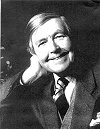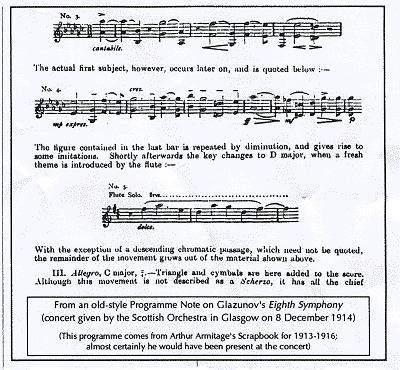 WORDS,
WORDS - IDLE WORDS ? Arthur Butterworth reflects on Programme
Notes
WORDS,
WORDS - IDLE WORDS ? Arthur Butterworth reflects on Programme
Notes
 WORDS,
WORDS - IDLE WORDS ? Arthur Butterworth reflects on Programme
Notes
WORDS,
WORDS - IDLE WORDS ? Arthur Butterworth reflects on Programme
Notes
It is not clear just when programme notes first became customary. In this country it seems that John Ella, a celebrated concert-promoter of the 1840s, was perhaps the first to provide them, although it is equally possible that Arne (of Rule Britannia fame) gave his patrons at least some indication as to the nature of the glees and catches to be sung at his Drury Lane vocal concerts.
In modern times the lavishly-produced - and often outrageously expensive - programme has become something of a mark of a concert-giving body's prestige. Do they serve any purpose? Well, they can, but regrettably very often do not. It depends on whom they are really addressed to. At one time it seems to have been assumed that all listeners were musically literate; for instance, that coterie of cultured upper-class members of the close-knit German community in Manchester - most of whom probably were indeed very musically literate and who would consider it de rigueur to be seen at the Hallé Thursday evening concerts before the First World War (and even into the 1920s and 1930s) - were provided with a printed programme which ran to several pages and which included copious music-type examples of principal themes from the works to be performed. Such musical extracts were illuminated (if that is not really a misleading word in this context) by long, learned and more often than not quite meaningless and utterly confusing verbiage which academic musicians have always loved to indulge in (and still do), perhaps believing that in this way they raise themselves to the level of the real musicians: the performers. [Even as late as 1965 I was asked to supply music-type extracts from my own Second Symphony for publication - believe it or not - in the Bradford Telegraph & Argus for an article which appeared on the very day of its Bradford première; a whole half-page it turned out to be (juxtaposed next to an article on housing in some newly-developed council estate near Odsal Top)].
'Eh, Simpkins, wot's a
seventh?', I whispered to my
companion - but he
didn't know either....Manchester school-children's Monday evening concerts in the 1930s were hardly less sumptuously provided with printed notes. I well remember reading one of these about the Elgar Violin Concerto which mentioned Elgar's 'characteristic fall of a seventh. 'Eh, Simpkins, wot's a seventh?', I whispered to my companion - but he didn't know either; so instead of listening to this stunning music I spent the next 50 minutes or so trying to imagine what a 'seventh' might be and how it related to what I was hearing for the first time.
Indeed reading about it rather
than listening to the actual performance
might even be the more
rewarding element of many concerts of this nature...Assuming the audience to be made up solely of erudite music students and other fashionable intellectuals who can all be expected to be familiar with technical processes and the current in-jargon (such as at up-market contemporary music festivals) it might well be part of the general frisson of intellectual superiority to provide learned dissertations about the music. Indeed reading about it rather than listening to the actual performance might even be the more rewarding element of many concerts of this nature: all that animated conversation in the bar afterwards: so stimulating!
But most listeners are not like this. They are certainly curious to know something about unfamiliar music, but lack technical understanding. Even were they to be provided with full scores of the works to be performed and literary descriptions of the course of the music being heard, this would not serve the prime purpose of listening to music. At one time it was rather smart to be seen at concerts with miniature scores in hand. In the case of a first performance this would hardly be possible- though there have been exceptions: for the first performance of Elgar's Falstaff at the Leeds Festival of 1913 miniature scores were on sale before the work had even been rehearsed - enterprise indeed on the part of Novello's of those days.
Another question arises: when, if at all, do listeners actually read the programme? Unless it is available some days beforehand - and some societies at one time actually provided their patrons with this highly commendable service, sending out the programme a week or so before the concert, much in the same way that a festival brochure nowadays prints all the programmes in one book - few people, even if they arrive at the hall in good time, trouble to read the programme carefully; they are distracted by social niceties such as making conversation with friends or acquaintances they chance to meet. But the more inquisitive listener does tend to read the programme afterwards when he gets home and this can be a useful aid to understanding what one has just heard.
What, then, should be the intention of a printed programme note? I have seen some absolutely dreadful, pathetic attempts to write programme notes, where the writer has not the faintest idea what to say and can only fall back on lame, lifeless, pseudo-descriptions of the progress of the music, written in dull, leaden words that fail to leap from the page and stimulate the reader's imagination (because the writer himself possesses none).
Mere catalogues of what instruments are employed, for instance, resemble nothing more stimulating than a builder's-merchant's order form. It has to be admitted that perhaps the majority are like this - quite useless and unrevealing, often mere pretentious, pseudo-intellectual rubbish. You know the sort of thing: '...the second subject, in the relative major key, is first heard in the horns and this is followed four bars later by an arabesque-like motif from the violas...'. Technically correct, no doubt: but it tells us nothing about how the music sounds or its emotional significance.
Here we find the kernel of
the problem: music just cannot
be described in wordsHere we find the kernel of the problem: music just cannot be described in words; it is a language that in the real sense of its own meaning cannot be translated. Concepts in German or Russian may be translated into Urdu, Icelandic or Swahili, for they are conveyed in a spoken language. Although music is a universal language it is not capable of conveying concepts and thus possesses no relation at all to verbal languages. It may well appear to do so when it is allied to vocal music, but this is really an illusion: music which illustrates poetry only does so by analogy and not by giving any form of translation carrying a precise meaning.
This, then, is the problem of the programme annotator: how to explain what music means. The simple answer is that it does not mean anything in the literal sense. Of course we all realise this, but we still hope that in some way a writer can explain it to us. He cannot; what he can do is to place the music in some analogous context by which it might be heard by each listener in his or her own intellectual and emotional way. In practice, this means that some salient pointers are almost always essential: the era in which the composer lived; his cultural and social background; the musical resources and fashions available to him; the multifarious extra-musical influences he experienced as well as the purely musical ones.

High among these would be the other arts - literature, painting, poetry, architecture and dance; the political atmosphere of the times; an awareness of human relations, of nature, animals, climate, philosophy (this latter perhaps most of all to the really serious composer); and every other facet of human thought and past experience that drives the creative artist.
This, then, might be the ideal that a programme annotator should set out to provide: to set the scene, as it were, to try to assess the situation as it might have appeared to the composer; to try to divine what motivated, or in the loftiest sense of that over-used word, inspired him.
Return to index